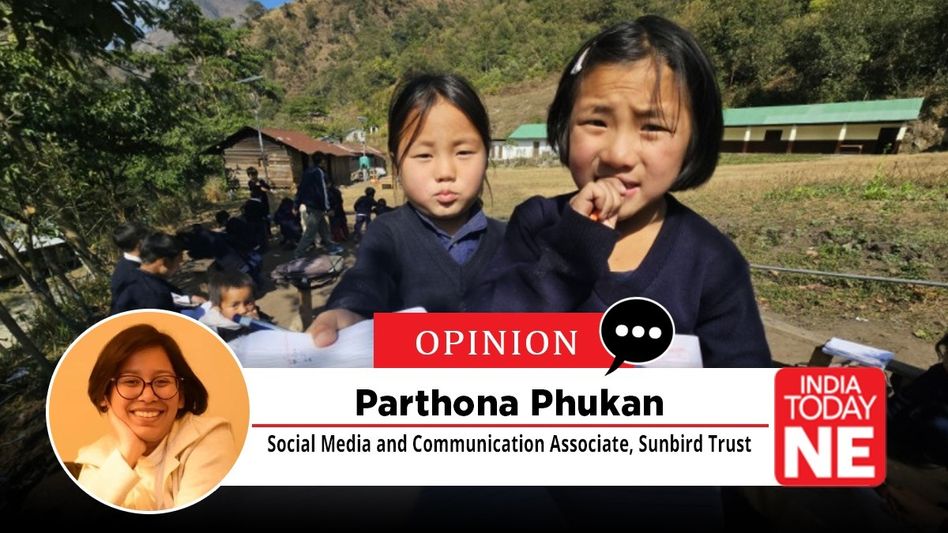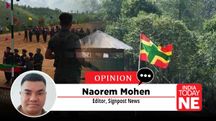
Beyond the maps of Arunachal: How Karo’s children are learning against all odds
Life in Karo moves to the rhythms of nature and survival, far from the conveniences the rest of the world takes for granted. Yet in this forgotten village, classrooms are blooming with hope strong enough to challenge the mountains around them.

Arunachal Pradesh, in Northeast India, is a state that leaves people in awe with its raw, untamed beauty. Hidden in its hills are villages so remote that they don’t even show up on Google Maps. The roads to reach them are cut through the steep mountains, and only 4x4 vehicles or Sumos can travel on them. Karo is one of these villages, a small settlement in Shi Yomi district, lying beside the Shi River and surrounded by the mighty mountains.
Reaching Karo is not easy. The road from Tato, the nearest town, takes nearly three hours and has barely improved since it was first carved out around 2011–12. During the rains, it turns into slush. The mobile network disappears for weeks. Electricity hasn’t reached yet. Evenings are lit not by grid-powered bulbs, but by generators and torchlights, and communication often depends on walkie-talkies.
But for the people of Karo, this is normal.

“Earlier, we had to walk all the way to Tato to bring rice on our backs,” recalls villager Tagin Tapo. “We mostly lived on corn and pearl millet. Now at least rice comes, even though the road is still bad.”
Most families cultivate broom plants, elachi (cardamom), kiwis and oranges, but these rarely leave the village. Transport costs and poor connectivity make selling produce nearly impossible. Only elachi (cardamom), reaches Tato for sale; the rest is consumed at home or fed to animals.
Healthcare is an even bigger challenge. Aalo, the nearest town with a good hospital, is nine hours away. “If it is serious, we have to go to Pasighat or Itanagar or even Dibrugarh,” Tagin says. Pasighat is about 12 hours from Karo, and Dibrugarh can take up to 15 hours. The isolation affects every aspect of life, and education is no exception.
Connectivity is so fragile that walkie-talkies are more common than mobile phones. After sunset, the sound of crickets mixes with the hum of generators. With no electricity, the village wakes with the sun and sleeps early with the dark. And somewhere in this rhythm of survival, education quietly slips behind.
Yet, what makes Karo beautiful is not just the river or the mountains. It is their belief in education.

Every morning, the Government Residential School (GRS) Karo fills with the laughter of nearly 70 children. When asked if they love school, their eyes light up before their voices do. In a place where children are often needed in fields, this eagerness to learn feels like hope taking shape. Even parents, despite the hardships, willingly let their children stay in the hostel. They know education can open the world for their children, something they never had.
But the journey hasn’t been easy for GRS Karo. For years, the school grappled with challenges that are common across the district which are irregular teacher attendance, weak physical infrastructure and limited access to basic learning resources. Shi Yomi, one of the remotest districts of Arunachal Pradesh, has long struggled with low literacy levels, and schools here often operate under difficult circumstances shaped by geography and isolation.
Recognising these challenges, Sunbird Trust stepped in. A non-religious, apolitical non-profit working in some of Northeast India’s most remote and conflict-affected areas, Sunbird is guided by the vision of “Peace through Education.” In partnership with the Arunachal Pradesh Department of Education, Sunbird Trust launched its Government School Transformation Programme in six schools across Shi Yomi, and GRS Karo is one of them.
Ajinkya Hande, Director of Community Development and Program Head for Arunachal Pradesh at Sunbird Trust, has spent nearly eight years working across Northeast India. When he first arrived in Arunachal, he expected the challenges to be familiar. Very quickly, he realised they were not.

“The communities here are very different,” Ajinkya explains. “Most of them have never worked with NGOs before, so there’s a natural suspicion. People assume we’ve come with big funds or some hidden agenda.” He added, “We’re trying to help people see that we are here to support them and their children. The benefits may not always be immediate, but they are meaningful in the long run.”
“Before Sunbird Trust’s intervention, student numbers were comparatively low. Since their support, enrollment has increased significantly,” said Joni Yajo, Headmaster of GRS Karo.
In just one year, the school has undergone remarkable changes. The hostel, dining area, classrooms, teachers’ quarters, and handwashing facilities have all been renovated. “As a government school, our infrastructure was far from up to date. But with Sunbird’s intervention, the changes have been drastic,” Joni added.
But the changes at GRS Karo are more than just physical. The real transformation can be seen in the children themselves. “Their interest in learning has grown tremendously,” says Headmaster Joni Yajo. “Whether it’s teaching-learning materials, stationery, or teacher training, every support has helped the school develop. Now, if a teacher is absent, students ask who will take the class. They don’t just wander around. There was a time when children would run away when teachers arrived; now, they come and call them. That change is remarkable.”
Ali Asqar and Anjali Sharma, the lead teachers from Sunbird Trust, live at GRS Karo and work closely with the school and the community. Beyond teaching, they guide local teachers, help with lesson and annual planning, train teachers in pedagogy, and create classroom resources from limited local materials. Together with the school and community, they set routines for study, meals, and hostel life, instilling discipline while keeping learning joyful. The parents of most of the children work full-time from morning till evening, so spending time with their children becomes difficult. With the school and especially the hostel in place, they now feel a sense of assurance. They know their children are safe, learning, and being cared for under Sunbird’s guidance.

Ajinkya explains that many of the students come from families where neither parent nor elders have ever been to school. With this in mind, Sunbird is planning beyond basic classroom learning. The team is working to set up science labs and is also planning an exposure visit to an ISRO Space Laboratory, Mechuka. For most of these children, it will be the first time they see a science or computer lab. “The idea is to give them access not just to essential infrastructure, but also to more advanced learning spaces,” he added.
Initially, encouraging community members to take part in the school’s development took time. There was hesitation and a bit of resistance. But Sunbird team members stayed on the ground, spoke with families, spent time with the children, and kept showing up. Over time, that consistency made a difference, and the community gradually began to engage more openly with the school.
“We recently made a library, completely set up by the community. Some brought bamboo, others helped with the thatch roof and wood, and many stepped forward during the construction. Even for the hostel, parents don’t just bring essentials for their own children; they bring them for others too. It’s heartening,” says Asqar and Anjali.

Some parents who couldn’t join the library work contributed money instead. With their support, the school was able to set up a small solar system, providing electricity where there was none. These contributions came directly from the parents.
This growing involvement has also changed how parents view education, not just for their children, but for themselves. “Earlier, parents hardly attended meetings. Now, they want to learn by themselves. To support this interest, Sunbird Trust team members at GRS Karo introduced a small adult literacy pilot programme. Parents, especially women from the community, attended classes for 12 days. The beautiful part was watching these women come for lessons either before heading to the fields or after returning from a long day of work. “We started with 12 parents, and by the end, the number increased to 25,” Anjali explains. “The will to learn after completing their responsibility towards the family and field was adding the silver lining to the efforts of this initiative. It was encouraging to see them come regularly and show genuine interest. Not just the students, even the parents now understand the importance of education.”

Teachers from GRS Karo have attended training sessions in Mechuka and Majuli, gaining exposure to new teaching methods and cross-learning opportunities. “We had never received such training before. Sunbird Trust took us to Majuli and to Sunbird’s Teachers Training Academy at Mechuka. We are now implementing what we’ve learned to improve our school,” says Joni.
Government support ensures children receive food, uniforms, and essential supplies, while school grants to maintain infrastructure. “In places where parents can’t afford rice, these provisions ensure children can at least eat and study,” says Joni.
The best part is that the Sunbird team has always been there for the kids, for the community. Their consistent presence has built trust, and now that trust has grown into action. Parents and the community are stepping forward, taking initiative for the school, helping children learn, and shaping their own future. In Karo, education is no longer just a dream; it’s becoming a shared journey, and that is the village’s biggest victory.
Copyright©2025 Living Media India Limited. For reprint rights: Syndications Today









